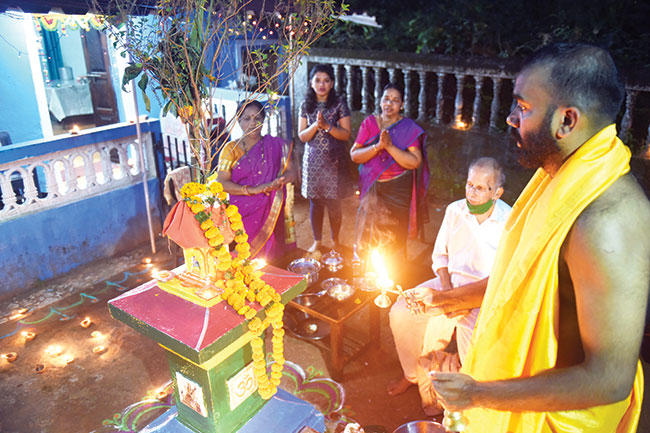
Hindu families keep a Tulsi plant at home and worship it daily. They believe it brings health and happiness. They offer water to Tulsi every morning and light lamps near it. Tulsi leaves are used in religious ceremonies.
The Story of Tulsi Vivah
Tulsi was once a woman named Vrinda, married to the demon king Jalandhar. Her devotion made him powerful. Lord Vishnu, disguised as Jalandhar, broke Vrinda’s chastity, leading to Jalandhar’s defeat. Vrinda cursed Vishnu, who turned into a black stone called Shaligram. From her ashes, the Tulsi plant grew. Vishnu promised to marry Tulsi as Shaligram.
Celebrating Tulsi Vivah in Goa
In Goa, people prepare for Tulsiche lagin by decorating Tulsi like a bride with clothes, flowers, and jewelry. They set up a canopy around Tulsi. Family members gather around Tulsi in the evening. A priest performs the wedding ceremony with prayers and offerings. A sacred thread ties Tulsi and the Shaligram. People share prasad, including sweets made of jaggery and coconut.
Community Celebrations
In some Goan villages, people celebrate Tulsi Vivah together in temples or community halls. They sing devotional songs and play music. These events strengthen community bonds and include sharing food and gifts.
Meaning in Daily Life
Tulsi’s Vivah links nature and spirituality in Hindu culture. Marrying Tulsi to Vishnu shows respect for nature and divine presence. The festival teaches devotion, purity, and marriage’s importance.
Conclusion
Tulsi Vivah is a cherished festival in Goa and India. It honors Tulsi, a symbol of purity and devotion. The festival includes rituals, family gatherings, and community events. Tulsi’s Vivah unites families and communities, showing faith and respect for nature.

